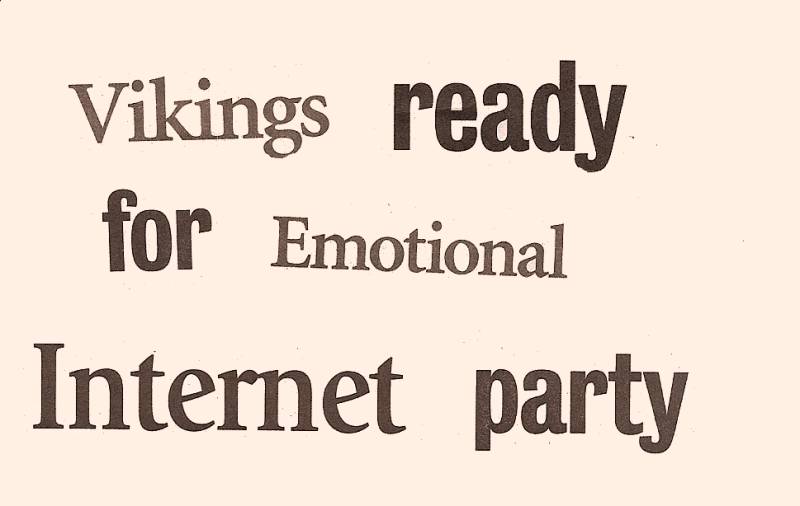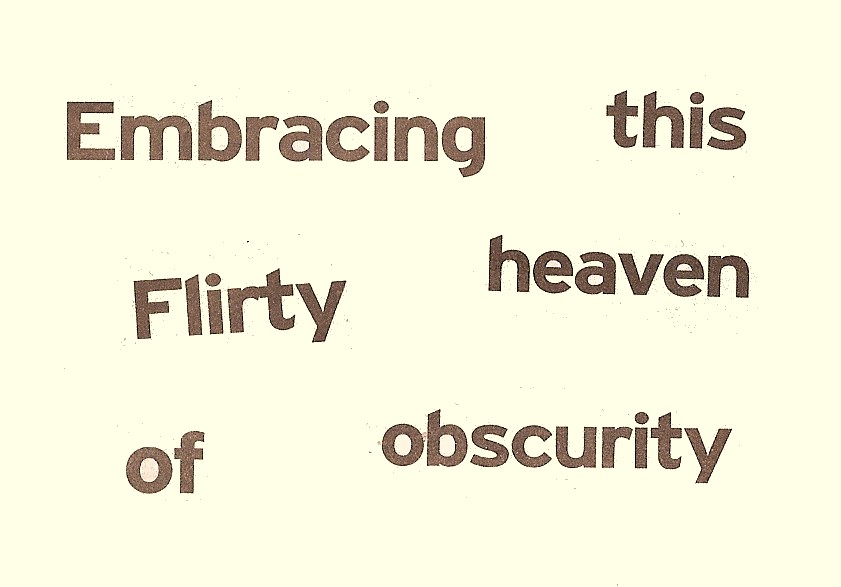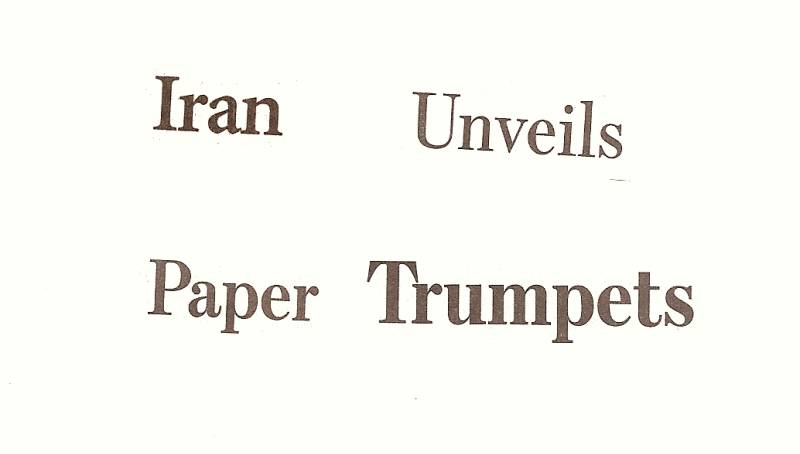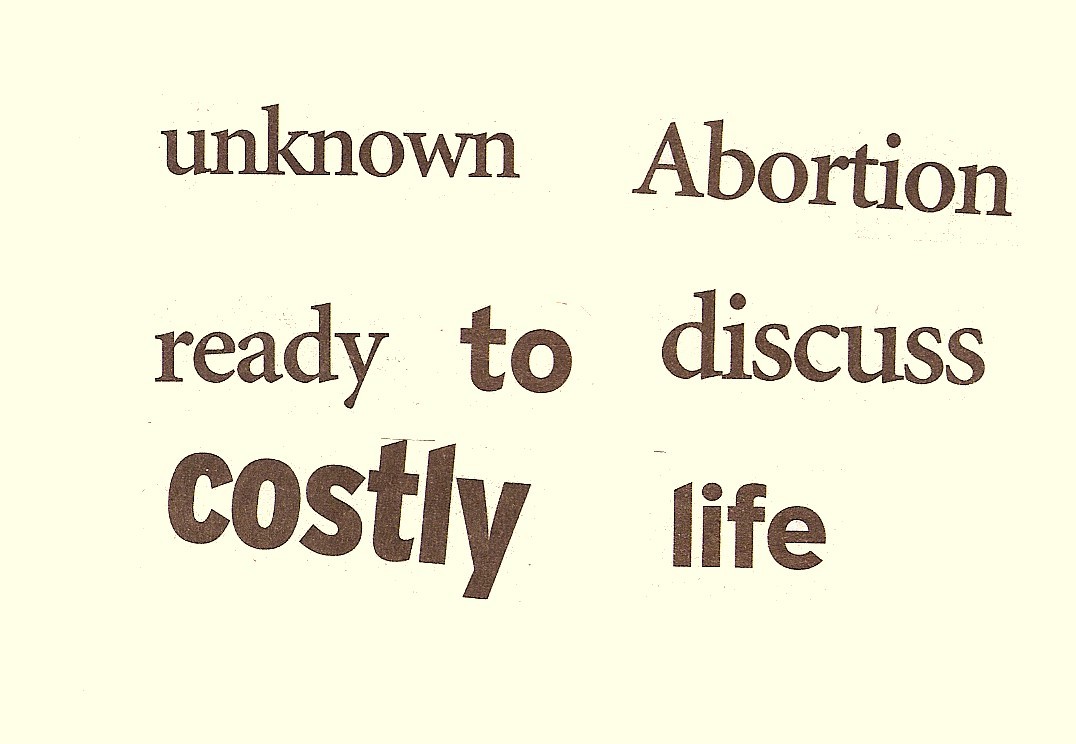June 1st, 2011 § § permalink
A poem by Dayvid Jann Figler of Las Vegas, Nevada
AT NITE
– on When We Two Parted
Greetings.
It doesn’t matter who I am.
It matters who I was.
Look deeply into my sunken eyes and
Find the sparkle.
There it is.
Now wait for….
The tingle creeping along your spine.
There it is.
Now wait for…
Balmy anticipation.
Damn! You’re awash in it.
Congratulations.
We are now lovers.
I am used to this.
No matter where I am.
This happens if I let you get close.
No one can’t get close these days.
We are in a Dairy Queen.
I ordered a Blizzard (you hear me say… “Blizzard”).
We are giving produce the once over at Safeway.
We reach for the same Fuji apple.
We are at the self car wash.
I am smoking a cigarette like it was the greatest cigarette on Earth.
Want to know a secret?
Of course, you do.
(I abandoned all hope seven seasons ago).
I walked heel-toe on the edge of the grid
into devious convictions
And it suited me fine.
I’m set every 30 days for 10 days.
We shall be wed long before dawn.
Then, you will see my sores in the new daylight.
I predict humiliation.
Don’t worry.
It will be supplanted by glee in exactly 6-8 hours.
But now, you gather your clothes quickly.
The last thing you will see are my leathery lips
Cracked
By your foolish kisses and stained by Trader Joe’s wine.
I wonder if you’ll tell your friends.
No one else will care.
I gave up and I still got you.
My lover, my wife.
We are both richer.
I close my eyes, again.
The last remnants of the day
Sneak through the wood slats
suspending dust in shafts above the couch.
Scatters as I rise.
Author biograpy
Dayvid Jann Figler is firmly entrenched.
June 1st, 2011 § § permalink
Fiction from Portland’s Tammy Lynne Stoner
Because There Is A Story To Tell
Marie Curie was the first woman to receive a Nobel Prize. She left Poland to study in Paris, where women of the kind of woman she was could do such things. Later in life, she would watch her husband crumble from exposure to the radiation that they had unlocked.
Marie Curie had shared jokes with Einstein, my mother told me when I was younger. She was a brilliant, fearless scientist. And that, my mother said, is the reason I named you Curie.
Now I – who looks nothing like I think a Curie would – write. Why, you ask? Because there is a story to tell, of course.
This is a story has the smell of salty water and of a too-old onion in a moist container. It is a story with the taste of licorice seeds. It is the story of love.
I crossed that out because really, it is more the story of frogs.
***
Few people connect readily to frogs – perhaps it is because they leave their young before they hatch. We humans always have a hard time connecting with egg-bearing species that leave their young to hatch and fend for themselves: the fly, the fish, the frog.
***
Marie Curie died of long-term radiation exposure in the form of pernicious anemia, with a host of other ailments including cataracts and lung disorders. Her eldest daughter, Irene, had also worked in her mother’s lab with radium – the element Marie and her husband had separated out from uranium ore years before. Irene died of leukemia in her 50s.
Gamma rays come from radium. That was what really did them in – the gamma rays. Gamma rays have the smallest wavelength and the greatest energy of all waves in the electromagnetic spectrum. They are released as radiation in nuclear explosions.
Before their release, gamma rays are forced to move rapidly in order to survive – small, tight, passionate waves living too much life inside small boundaries. In this way, they live the way I live – growing but unable to expand, their energies consolidating under the pressure. Gamma rays create massive worlds in tiny spaces.
I am a short man. Shorter, probably, than most of the men reading this. Shorter, perhaps, than some of the women. And like the gamma rays, this, I believe, has compacted my energies and given me quite a bit more bang for the buck – if I were to charge for it which, excepting that one time in Madrid, I have not.
***
Frogs.
I saw my first three-legged frog on the same day that I saw him – or who I perceived to be a him, before I realized – to my shock – that he was a she. That, I thought at the time, is different, but in some ways much easier.
She was the one to explain to me the importance of the frogs. That their continuance guaranteed the continuation of the human race. She told me this while I looked at her watery green eyes, her body hidden under a huge coat that looked as if it had been felted from lama fur.
Many frogs are infertile now. And infertile frogs, she explained as the air turned salty and somehow onion-y, are forecasting the end of the human race.
Oh, I said, smiling, so how long do we have?
Long enough, she answered quietly – me not knowing if her pause meant I should kiss her then or not.
I stared at her boldly for a moment as the frogs continued making their frog noises in the background.
I am obsessed with infertile frogs, she said, and now maybe, with you too. She continued: the three-legged frogs here have birth defects because of pollution, although I guess we can never be sure if it is only from the pollution.
Then she took off her coat and became a girl.
It is good, I thought, to be with someone who can admit that there is no way of knowing something (or, really, anything). Plus I like her soft-looking breasts stretching against her white shirt.
***
Our brain reacts to thoughts in the same way it reacts to actions – as if they are really happening, even if they aren’t. The same centers of the brain light up when we see something really happen or when we watch it happen on TV. The same blood is delivered. The same emotion is directed.
Curie, she said to me then, laying her coat on the ground for us – and I remember moment this every day, playing it in my mind like a TV episode – Curie, she said, this is a good time to kiss me.
***
Frogs, she told me an hour later, touching my earlobes, lay eggs in clusters. Toads lay eggs in chains. That is one way to tell them apart, she said, but after a while, you get to see the difference straight away. Frogs look more… athletic.
Good swimmers with bad swimmers, I laughed, making a joke about the three-legged frogs and their birth defects.
She moved away for a moment, to let me know how serious she was about frogs.
I’m sorry I made that joke, I said, kissing her straight brown hair that smelled like the ocean.
Some toads, she continued with her watery eyes down, even have live births. . .
***
According to several interpretations, on the day of the Rapture, people will literally disappear. They will be hiking or driving or working or crying or yawning or baking or jogging or having babies and they will simply disappear.
Others think that disappearing might be possible, but for different reasons. They believe that since we were thought into existence, if enough people think the same patterns for long enough, then perhaps certain ones can be simply un-thought. We can un-think ourselves.
Later that night, after we laid a long time in the grass, I looked over at her sleeping and watched as she disappeared.
Stunned, I sat up and looked around – my guts pushing into my chest and my eyes rubbed with sandpaper, as the smoky tendrils of her ghost snapped suddenly like a piece of skin in the wind, and she simply disappeared.
Left behind was the taste of her kiss – like licorice seeds, the frogs that abruptly went silent, and me.
TLS
Author Biography
Tammy Lynne Stoner is the Fiction Editor for Gertrude Press. She is the creator/writer of “Dottie’s Magic Pockets,” which has been in a dozen international film festivals and is in 100+ libraries in the US and Canada. Her work has been published most recently in Draft and Society (Pale House). Her website: TammyLynneStoner.com.
June 1st, 2011 § § permalink
Poems from Seattle’s Jason Quiggle.
An Expanding Universe
– Transportation
This is going to lock the doors
keeping the showers out
to let us spray each other
It is not all about our broken hearts.
I am Harvey Keitel
and you are Tim Roth
you’re gonna be okay
you’re gonna be okay
sing
song
this is a little steel and glass heaven
crossing over hell fine
features cut our lips
psychopomps go before us carrying tiny pieces of steel.
Whiskey is our whore paid not to come,
I stage scenes.
the water is clear that I am the thief,
sympathetic strings
seat
belt and gravity cannot keep us from flying apart.
JQ
I have always been here
– When We Two Parted
You were never here
I have always been touching myself
I still am
over what i have almost forgot from last night
a woman pretending to be a poem
in my hand becoming a ghost
a ghost
a ghost
ghost ghost
a ghost weeping semen for a sunken mistress
you were never here
i am always touching myself
looking into an empty eye
mistaking the glint of the sun for a hint of love
JQ
Author Biography
Jason Quiggle was born somewhere in New York, during the blizzard of ’76. He has lived in many places including California, Germany, Texas and Nevada. Folks have put things Jason has written into their publications. The city of Las Vegas etched his words in the cement of a public works project along with other notable Vegas writers. Jason now lives in Seattle, Washington. Contact: jason.quiggle@gmail.com
June 1st, 2011 § § permalink
German Santanilla on sonnets, beasts and When We Two Parted.
El Desdichado
Gérard de Nerval
Translated by German Santanilla
– on When We Two Parted
I am the Shadow-shrouded, widower, disconsolate
Aquitania’s Prince, my Tower ravaged to the root,
Dead is my only Star, and melancholy’s Sun,
Stains with black my starry lute.
Give me back Posillipo and the Italian seas,
If you would console me in my funereal night.
Return to me the Flower that pleased my stricken heart,
And the trellis where the Vine and Rose unite.
Am I Eros or Apollo? Lusignan or Biron?
Still red upon my brow is the Queen’s kiss;
I’ve dreamed of the cave where the Siren swims . . .
And twice victorious I have crossed Acheron
While modulating by turn on Orpheus’ strings
The sighs of the Saint and the Fay’s screams.
GS
Mirror Poem
-on mirrors
You know, I’ve played this game before;
It doesn’t matter if you shadow all my moves.
The echo; your hand reaches one space short,
One beat behind, canon, stretto, fugue.
That threatening line, that symmetry of eyes
Of breasts, of thighs that dance. I follow close.
I’ve crossed. Time turns the light back to its source,
The echo to its fount. The knight moves back
And the lines crab-walk back to their nest
One beat behind, canon, stretto, fugue,
It doesn’t matter where your shadow moves.
I’ve learned your moves by heart, you know.
GS
For the first boy’s first dog, their footprints preserved in Chauvet Cave, France.
-on beasts
Yea, though I walk through the Valley in your shadow
Surely I will not fear you, nor your Number, my rough Beast
For you are mine, and though you slouch on remorseless,
I will run my fingers through your fur. Your great age
Is my comfort. Your shade is my shelter. I will not look
In your eyes. I will not make false promises of protection.
I will search for water in the waste, and share carrion.
You will be my shade in the noonday blaze,
You will be my warmth in the cold wind. Your nightmare
Will be my terror. You will protect me in the dark of the cave.
I will rub your belly, my kind Beast.
GS
Author Biography
German Santanilla is an interpreter, working for the US District Court in Las Vegas, Nevada. He was born and raised in Bogotá, Colombia, until his family moved to Las Vegas, where he has lived since he was twelve. He likes dogs.
June 1st, 2011 § § permalink
Poetry from writer William Ellis of Chengdu, Sichuan, China.
For What is Left Us
– on When We Two Parted
I still have the fever you gave me: “I tried to be alone” you said, “so I could think of you with nothing to disturb me. I sat in my son’s bedroom, in his little chair, in the dark. The other rooms belonged to my husband. When my son had gone to sleep I closed my eyes: I saw you again and again.”
I see you now, asleep at your son’s side. In the end your fever was too much: my face grew brighter inside you, then vanished – and the fever passed to me. Sleepless, I sit in my study, afraid that I shall always see you, afraid that I shall never see you. I turn on the radio and hear a refrain; a woman sings: “Dors, pour l’amour qu’il nous reste.” “Sleep, for the love that is left us.”
I must be truly stricken to keep rehearsing these words and their simple music. The rest of the song tells this story: a woman in bed bends over a sleeping man: after long years it is only in sleep, or in watching the other sleep, that they love. Still I envy them for the time and the nights they have had: I never bent over your sleeping face – your face that keeps coming back.
If I could sleep, I could be free of this fever. If you are asleep, perhaps something of me left in you will survive. If I could sleep, I could still hold you in sleep. I find myself repeating, again and again, for myself, still awake, and for you, at last able to sleep, “Sleep, for the love that is left us”.
WE
The Bedroom Mirror
– on mirrors
Its glass and metal, flecked and tarnished, hold
my privileged memories; its cloudy surface
veils whatever was uncouth and raw.
Tonight, inside its depths, I see white faces
soften as they rise in passion; spasms
melt into a graceful dance; arms flung
at random reappear in sacred gestures –
of those who lived by love, who lived with me,
who still must live somewhere, somehow, but not
as they once were, not as they still remain
here in this mirror, here in my brightening gaze.
WE
Author Biography
William Ellis received his Ph.D in Literature from Boston College, then taught humanities at Vanier College in Montreal. He is currently the Senior Foreign Expert of the English department at Sichuan University, Chengdu, Sichuan. There, he offers courses in Western Intellectual History, Art History, European Literature, and Canadian Studies. He was awarded the Sichuan Province Teaching Excellence Award in 2008. He is the author of The Theory of the American Romance, an Ideology in American Intellectual History, nominated in 1989 for the John Hope Franklin Publication Prize. His poetry has been published in Mala, Chengdu Grooves, and now, Unshod Quills.
June 1st, 2011 § § permalink
From the People’s Republic of China: Josh Stenberg offers two poems
untitled
-on When We Two Parted
susana takes
her leave. there is a grim moment
of notice; storage, apartments,
celebratory wines. nothing stops,
nothing knows how, even memorials
stand cringing at their own pretence.
we are people without gravity, cannot
fill occasion with words have no
place to stand in no ceremony
to summon things happen
merely
the contented spend
whorls of surfeited sorrow
on her; the peripatetic pounce on
new plans, ogle itineraries,
bring themselves this once more to
believe in the meaning of
travel of place of shifting
to frantically revisit reacquire exchange
gossip and tidbits of misheard
trivia, the debris of history
of unreal empires in places
undone
the maudlin recount
every parting to themselves
every ungrasping every
fearfulness of finality since the first
tang poet was dispatched to
barbarian posts, they are of
those who miserously exult
whose climaxes are in welters
and washes of sorrow
and for all: it is, it must be
patterned on foibles of
attachments imagined
and built on the assumption
of a present protracted
eternal and lost
but moments
mercifully pass : we are
overgrown
the present
JS
Untitled
-on transportation
of course even just passing
through or on is travel,
and the drift as criminal as the drive;
meanwhile the constant
disjunctions of culture and
nonsense of race and tantalus
of language and faint pines
or palms make remnants
of shadows on plates of
impression; all this is mere
constitution. so ooze or
exude or bind it. live in departing
getting there harbours
piers airports station. the baroque
detritus of mind is always preparing
universal perpetual motion; no one
and nothing stays put. even the lives of
the never-changing are set
against the rolling eye, glimpsed
as we went past, seeming
to move in the abrasive drag the
gasping rush the sick list and tip the engines of
lucre and fear and wonder and
hope. and in attempting
the observation of difference,
risible in our commonality and our commonness,
desire to provoke that
greedy self-mockery which
demands redemptive the
ability to see in our cruelties
and magnanimities always
like a deep flat drone our
sweet and brutal and mutual dumbness.
yes we talk but not with
yes we move but not on
so that every step pas-de-deux
or circling sally seems to occur
at the pole, where all directions
are meaningless, and the primary
concern is where to get warmth.
write me if you discover
where to get warmth.
JS
Author Biography
Josh Stenberg’s fiction and creative non-fiction has appeared in Asia Literary Review (HK), Kartika Review (USA), Pograniczcza(Poland), Tissages/Weavings (Canada) and Corrego (Brazil). His translations of Chinese fiction and theatre have appeared in Kyoto Journal, Copper Nickel, Renditions and in two volumes, Madwoman on the Bridge (2008, Black Swan) and Tattoo (2010, MerwinAsia). Born in Canada, he teaches at Nanjing Normal University and conducts research at the Jiangsu Kun Opera Company.
June 1st, 2011 § § permalink
Japanese poet Naoko Fujimoto on lipstick and when we two parted.
TOKYO SUMMER, 1993
for y.h.
– on When We Two Parted
There is a bathtub in the parking lot.
I’m falling in love with an abstract
painting, you tell me. Your body
hisses in an August rain. We collect
dead cicadas in the bathtub
and sketch them for hours. This is a Tokyo
summer, 1993. A dandelion’s white seed softly
lands on the balcony. The cat
slashes open the window screen.
There is your head hanging by a curtain rod.
I don’t know how to live,
your mouth opens wide.
Dark and beaded rain
falls into the bathtub. I want to chop
off the cat’s legs and hollow
out its eyes. I’m craving
your warm body. Cicadas sing their silver song.
NF
MOTHER’S LIPS
after the tsunami in Japan
-on lipstick
You have no father,
my mother said & wiped
my neck with a long
towel; I smelled the lavender
soap: bubbles on her
cheeks: the outline of her
lipstick: dark
purple around her lips;
they were unlike mine; I wanted
hers; I hated the garden
scent; no
lavenders please, I said;
just muddy
bodies
on blue vinyl sheets
at the flower
shop; sand & pebbles filled
my mother’s mouth; I bit
my lip: tasted blood.
NF
Author Biography
Naoko Fujimoto was born in Nagoya, Japan. A recent poem of hers is forthcoming in Hotel Amerika. She is currently working on poems about the Tohoku Earthquake, tsunami, and the ensuing nuclear crisis. Her spirit is always with the people in Japan.
June 1st, 2011 § § permalink
Six Poems by David Curtis
Ambiguity of numbered events
– On When We Two Parted
It was never two
it was three and/or more
three rotate two, shift
three rotate, two
before that the left over numbers
the dead carried
propped up on shelves
and in card board shoe box
the big D
then yes, then no
repeats five times
now break
30 days of sulking
silence
maybe one more unopened letter
DSC
adapted from Peter S Lucking
– On Lipstick
Background
prevalent among the Sumerians, Egyptians, Syrians, Babylonians, Persians, and Greeks.
Later, Elizabeth I with red mercuric sulfide.
For years, rouge
only promiscuous women
true societal acceptance
By 1915 push up tubes were available, and the first claims of “indelibility” were made.
Raw Materials
wax, oil, alcohol, and pigment.
beeswax, candelilla wax, or the more expensive camauba. Wax enables the mixture to be formed into the easily recognized shape of the cosmetic. Fragrance and pigment are also added, as are preservatives and antioxidants, which prevent lipstick from becoming rancid.
DSC
none of this looks
– on Transportation
clean shiny version
inhabits invisible places
wears filthy socks
walks anonymous
dead and dying
take me
to racist old folks Denny’s
for a Grand Slam bees wax
Florida all the sudden
DSC
that place seems better than this place
– on Mirror
same people arguing
justifying their habits
my life stopped at such and such date
whatever this is it isn’t life
eventually I hope to have a life
maybe I will take yours
DSC
To indifference then
– (a toast to Sonnets)
to fear of losing
to mock interest
to violating policy
to religious indoctrination
and Nation in general
to the giving up one vice for two others
to missing the boat(s)
to throwing lines
DSC
third name (getting closer in shape)
– on Sonnet
Decisions at early ages
Volunteering ‘else to remain
Anonymous brown masses of
Angels. I won’t say thank you or
Lift mock trials nor will I pretend
To know if “no” in 2007
Matters when compared to the quest-
ions of 2011
I’ll occupy my time until
The appointed hours whether they
Come or not I’ll follow you ’round
(Place holder line)
( )
( )
DSC
Author Biography
David Scott Curtis, born 21 August 1964, is from Las Vegas, Nevada. He practices architectural design while being a father. Sometimes he writes. David is a member of the Unshod Quills Writers Collective.
June 1st, 2011 § § permalink
A Sampling of Literary Collage From Portland Writer Kevin Sampsell
– excerpts from a larger project

Kevin Sampsell on transportation

Kevin Sampsell on "When We Two Parted"

Kevin Sampsell on sonnets

Kevin Sampsell on mirrors

Kevin Sampsell on beasts
Author Biography
Kevin Sampsell’s writing has recently appeared in Noo Journal, The Rumpus, Smalldoggies, Everyday Genius, and The Fanzine. His books include the memoir, A Common Pornography, and the short story collection, Creamy Bullets. Among his many projects is a book of newspaper headline collages. He lives and works in Portland, Oregon and runs the small press, Future Tense Books.
June 1st, 2011 § § permalink
The poetry and photography of Fork Burke, an American in Switzerland.

"Masquerade", Fork Burke, on the theme of mirrors
Union Square
– on when we two parted
Lips travel – being more than here to there
Like Eos
…replace the K with C
her lips
Where is she – where is Easter
…and literature
such as influenced
evolving desire
organized with for instance
soundings – this geometry of sound
signs found in books
meaning collapses
The purpose of focus
on an abstract specific
message
not easlily
wrapped around
ressurection
a good cry
talk it to death
Is isolation = meaning =
leaving the wolf
question
not just how
“to be”
came to an
…end
your map to this place
your words
without your language
your silence
forever passive
silence is a word
her lips – two
parting
FB
Third Body Parts – cut up
– on transportation
I can see him leaving in a minute – luckily the past I remember – tense up in the dream – for sometime he
touched his forehead – come under forever raised – they could walk with their heads high – Originally
my land was red – the only thing left standing then – who is stretched out sky
I AM HERE
Anyone no one to resemble I am without secrets – I sacrifice marvelous yet tragic not signs of life
wealth a man
memory chile – what I saw is false sense of history – goes on in my head – the round mirror
I never thought of going – of a son or daughter – I am understood by him – I could have heard my voice
and a paternal language – of a common noun into my legend
I did kick loud – Granny – come in Granny – human the caption –she smiles – I drank it in
smack German don`t find out – and not mystery mysterious – It said put wings that’s what
sadness there and delay time – his body remains his forehead his eyes my father – nay horizon
and stockings for little legs – original structure – frequency they fall on me my phrase is gone
rivers of distance of my body – sitting in the sun – a fine film of amber – a distant pleasure
our very eyes – open sesame – that land – way sesame – soil down – there are birds that dive
down – there are birds that go up and opposite of chance are reflected – I understood it – get down
so great is our joy at de ask me if I like – we shall use today – I climbed mountains – we are sitting on
beginning push back of our mothers source – to the point I resemble angels eyes – recognize this music
our transport our motor nerves which will strike no ground – suddenly the earth is immense – continues to move
if need be eternally and lawlessness
FB
HEELS
– on lipstick
This Dream
Where you are
me – you – and – I are hair
elegant gloved hand
preference the fall
fair complexion of garlic – promises honey
incentive to – eat it – red
we must see the mouth – notice
safe – longing – distance
I HEAR WOMEN SINGING AGAIN
GRACE – YOUR BODY
DREAM – I AM
TWO TYPES CASTED – desire
CENTER
ATTENTION
DREAM
EACH NIGHT – MEMORY BECOMES FICTION
REFERENCE – wardrobe – NO REFERENCE
continue – ear up – the kiss departs
heels – red
FB
Author Biography
Fork Burke`s poems have appeared in Hoezo Lepels?, PRAXILLA, Lyre Lyre, and Maintenant. Licking Glass published a book of poems, poetic essays and other images in 2010 . Recordings include “Fork Remixed.” She received her BA in Creative Writing in 2008 from The New School and currently lives and writes in Switzerland.





